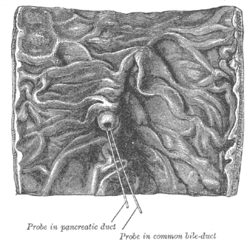The sphincter of Oddi (also hepatopancreatic sphincter or Glisson's sphincter), abbreviated as SO,[1] is a muscular valve that in some animals, including humans, controls the flow of bile and pancreatic juice out of the gallbladder and pancreas respectively through the ampulla of Vater into the second part of the duodenum. It is named after Ruggero Oddi.
| Sphincter of Oddi | |
|---|---|
 Interior of the descending portion of the duodenum, showing bile papilla | |
| Details | |
| System | Digestive system |
| Location | Surrounds the Major duodenal papilla |
| Function | A circular muscle (sphincter) that controls the secretion of pancreatic juices and bile into the duodenum, and prevents reflux from the duodenum. |
| Identifiers | |
| Latin | m. sphincter ampullae |
| Acronym(s) | SO |
| MeSH | D009803 |
| TA98 | A05.8.02.018 |
| TA2 | 3112 |
| FMA | 15077 |
| Anatomical terminology | |
Structure
editThe sphincter of Oddi is a circular muscle band (sphincter) that surrounds the major duodenal papilla.[2]
Function
editThe sphincter regulates the secretion of pancreatic juice and bile into the duodenum.[3] It also prevents reflux of duodenal contents into the ampulla of Vater.[4] By preventing reflux of the contents of the duodenum, the sphincter of Oddi prevents the accumulation of particulate matter and sludge in the bile ducts, reducing the risk of cholangitis. The sphincter of Oddi also allows retrograde filling of the gallbladder.[5]
The sphincter of Oddi is relaxed by the hormone cholecystokinin[6][7] via vasoactive intestinal peptide.[8]
Clinical significance
editPancreatitis can result from a failure of pancreatic secretions to drain properly. One possible cause of impaired drainage of pancreatic juice is blockage of the sphincter of Oddi. A common cause of blockage is a gallstone in the common bile duct.[citation needed]
Opiates may cause spasms of the sphincter of Oddi, leading to increased serum amylase levels.[9]
History
editThe sphincter was described for the first time by Ruggero Oddi when he was a young student in 1887.[10] This description followed extensive research into the physiology of dogs and detailed histological examinations of humans and many other species.[1]
Other animals
editIn many mammals (including mice, guinea pigs, dogs, and opossums), the smooth muscle around the ampulla of Vater does not form a sphincter.[11]
References
edit- ^ a b Yamada T (2011-10-13). Textbook of Gastroenterology. John Wiley & Sons. p. 78. ISBN 978-1-4443-5941-1.
- ^ Horiguchi, Shin-ichiro; Kamisawa, Terumi (2010). "Major Duodenal Papilla and Its Normal Anatomy". Digestive Surgery. 27 (2): 90–93. doi:10.1159/000288841. ISSN 1421-9883. PMID 20551649. S2CID 21666445.
- ^ Horiguchi, Shin-ichiro; Kamisawa, Terumi (2010). "Major Duodenal Papilla and Its Normal Anatomy". Digestive Surgery. 27 (2): 90–93. doi:10.1159/000288841. ISSN 1421-9883. PMID 20551649. S2CID 21666445.
- ^ Horiguchi, Shin-ichiro; Kamisawa, Terumi (2010). "Major Duodenal Papilla and Its Normal Anatomy". Digestive Surgery. 27 (2): 90–93. doi:10.1159/000288841. ISSN 1421-9883. PMID 20551649. S2CID 21666445.
- ^ Ahmed, Abdelwahab; Zuchelli, Toby (18 July 2022). Anatomy, Abdomen and Pelvis, Sphincter of Oddi (Hepatopancreatic Sphincter). StatPearls Publishing. Retrieved 19 February 2023.
- ^ Costanzo L (March 2006). BRS Physiology (Board Review Series) (5th ed.). Lippincott Williams & Wilkins. p. 220. ISBN 978-0781798761.
- ^ Liddle, Rodger A. (2003-01-01). "CCK (Cholecystokinin)". Encyclopedia of Endocrine Diseases: 485–489. doi:10.1016/B0-12-475570-4/00260-2. ISBN 9780124755703.
- ^ Wiley JW, O'Dorisio TM, Owyang C (June 1988). "Vasoactive intestinal polypeptide mediates cholecystokinin-induced relaxation of the sphincter of Oddi". J. Clin. Invest. 81 (6): 1920–4. doi:10.1172/JCI113539. PMC 442644. PMID 3384954.
- ^ Druart-Blazy A, Pariente A, Berthelemy P, Arotçarena R (December 2005). "The underestimated role of opiates in patients with suspected sphincter of Oddi dysfunction after cholecystectomy". Gastroenterol. Clin. Biol. 29 (12): 1220–3. doi:10.1016/s0399-8320(05)82204-3. PMID 16518275.
- ^ Ono K, Hada R (July 1988). "Ruggero Oddi. To commemorate the centennial of his original article--"Di una speciale disposizione a sfintere allo sbocco del coledoco"". Jpn J Surg. 18 (4): 373–5. doi:10.1007/bf02471459. PMID 3050213. S2CID 30812172.
- ^ Higashiyama H, Sumitomo H, Ozawa A, Igarashi H, Tsunekawa N, Kurohmaru M, Kanai Y (February 2016). "Anatomy of the Murine Hepatobiliary System: A Whole-Organ-Level Analysis Using a Transparency Method". The Anatomical Record. 299 (2): 161–72. doi:10.1002/ar.23287. PMID 26559382.
Further reading
edit- Ballal, M. A.; Sanford, P. A. (2000). "Physiology of the sphincter of Oddi--the present and the future?--Part 1". Saudi Journal of Gastroenterology. 6 (3): 129–46. PMID 19864708.
- Ballal, M. A.; Sanford, P. A. (2001). "Physiology of the sphincter of Oddi: The present and the future?--Part 2". Saudi Journal of Gastroenterology. 7 (1): 6–21. PMID 19861760.